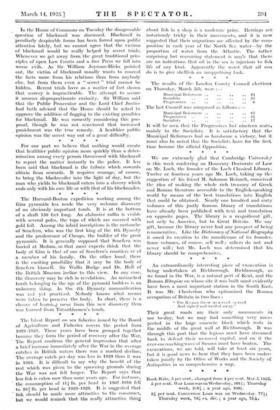The latest Report on sea fisheries issued by the Board
of Agriculture , and Fisheries covers the period from 1919-1923. These years have been grouped together because they form the period of recovery after the War. The Report confirms the general impression that after a brief increase immediately after the War in the average catches in British waters there was a marked decline. The average catch per day was less in 1923 than it was in 1913. It is difficult to say why the benefit of the rest which was given to the spawning grounds during the War was not felt longer. • The Report says that less fish is eaten now than some years ago. For instance, the consumption of 411 lb. per head in 1907-1910 fell to 381 lb. per head in 1920-1923. It is suggested that • fish should be made more attractive to the consumer, but we would remark that the really -attractive thing about fish in a shop is a moderate price. Herrings are notoriously tricky in their movements, and it is now suggested that their migrations arc affected by the com- position in each year of the North Sea water—by Our proportion of water from the Atlantic. The rather surprising but reassuring statement is made that there are no indications that oil in the sea is injurious to fish life of any kind. Apparently the worst that oil can do is to give shellfish an unappetising look.














































 Previous page
Previous page